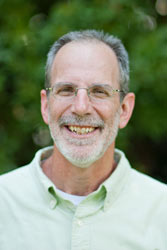How to Prepare for Christmas Part II: Zechariah
The first “fear not” visitation was the archangel Gabriel’s visit to the priest Zechariah announcing that his decades-long prayer for a child had been heard. The news, designed to bring “joy and delight” to Zechariah, first produced fright. So what’s up with that? Why the scare? Do you have to be off-balance in order to receive good news?
I can relate to Gabriel’s mission. As a boy, if I knew my older sister was going into our unfinished basement, say to get something from the freezer, I would run around the outside of the house to get there first. I would crouch in a shadow of that dim basement…waiting…waiting. When she walked by… well, you get the picture. Like the Angel Gabriel, I too wanted to bring joy and delight… just not to my sister. Read the passage (Luke 1) and see if it doesn’t sound like a similar set-up. Zechariah is chosen by lot to burn incense in the temple, a once in a lifetime opportunity. Remember, only one priest actually entered the temple interior, a 30 x 60 dimly lit sacred space. Imagine this elderly priest, padding solemnly into this supposedly empty chamber, while the crowd waits outside. Is this not a perfect time for a scare?
I picture Gabriel, with his back to the Holy of Holies, holding his breath (if archangels breathe) and waiting until Zechariah passes within an arm’s length and then he jumps out. Well, Luke doesn’t say that Gabriel jumps out, but rather, “Then an angel of the Lord appeared to him, standing at the right side of the altar of incense.” But that’s even better! I would have given anything to suddenly appear, standing at the right of the freezer! In strong language, Luke describes Zechariah’s response as “gripped with fear.” Then Gabriel says that line: “Do not fear… your prayer has been heard…”

So if God didn’t want Zechariah to be afraid, why ambush him in a dark room? Why send an archangel? I believe God wanted to knock Zechariah off balance. In fact, off-balance is the only way that we will hear good news. And sometimes not even then.
In Zechariah’s case, the good news was that he would be given a son, but this was difficult for Zechariah to receive and his first reaction is to object. “How can I be sure of this?” he questions. A moment before Zechariah had been immobilized with fear, but now he is challenging an archangel? Knocked off-balance, Zechariah quickly tries to recover. He is looking to regain his balance, trying to regain control. He wants a guarantee before he believes. He wants to dictate the terms of the gift.
You have to wonder, what does Zechariah want more: the child or the control?
That’s why God scared him. God is showing Zechariah a central truth: receiving is about trusting. Either you receive by trusting, or you avoid trusting by trying to control the terms. But you cannot have both.
This is true about receiving any gift, but it is especially true when the gift is a child. Any parent knows, you begin losing control immediately upon conception. You think having a child means that you will take the child places, to the park, hardware store, grandmas. You think you will teach them about life. But the opposite is true. The child takes you places. The child takes you to fears, angers, and jealousies you didn’t think possible of yourself. They take you to heart-rending passion you can’t hide. You find yourself applauding loudly for the most awful acting. You cry crocodile tears over endearments scrawled on smudged cards. One moment you distress over selfish bickering and then the next feel chest-bursting pride at your child’s compassion for a bug. You find that the child, who is so yours in looks and moodiness, is so not yours. They grow up. They have a life of their own. To receive the gift of a child, means you must immediately begin letting them go.
Zechariah and Elisabeth found this out soon enough with a toddler. If they lived long enough, they would have seen their son John – full of the Spirit from the womb – begin to dress and eat strangely, and cry out a message that shook one kingdom out and another in. They would have seen their fragile baby boy thicken into a shaggy-maned man whose voice thundered repentance, calling a nation to lose their hearts to God while he was on his way to losing his head. Yes, John—their gift from God—was their boy, but never their possession. He was a joy and delight to them, but never on their terms. So it is, to receive the gift of God, you must first lose control.
And that is why God intentionally frightened Zechariah. He had to empty the old man’s hands in order to fill them. Christmas begins with a scare. God wants to empty us to fill us. To receive the gift of God’s salvation, then you begin by doing the most terrifying human act: you give up control. To gain your life you have to lose it.
The gift of the Christ-child will grow up in you in unexpected ways. His life takes you to all the places you dare not go alone, into all the fears and angers, all the jealousy and selfish bickering. But then, and this is the most scary part of all, you must let Him stand and rejoice over your fumbling attempts at love. You must learn to endure His enjoyment, His crocodile tears over your scrawled endearments.
This news knocks you off-balance. The unbelievable good news that God offers His life as a gift upends our foolish attempt to gain it on our own. What is truly frightening is the possibility that we might hear the good news and chose control over grace.
Don’t do that. Hear the news! God wants us. He wants us to be His child, His delight and joy. This is why Gabriel sneaks up on Zechariah, to empty his hands in order to fill them. This is why John lost his head, to give us back our hearts. This is why God scares the control out of us, so He can put the love into you.

Roger Edwards joined The Barnabas Center in 1991. He works with both individuals and couples, helping people confess their need and embrace their available choices to lead healthier lives. Roger also teaches and leads discussion groups and retreats applying the Gospel to everyday life. He is a licensed clinical mental health counselor (LCMHC), holds a master’s degree in biblical counseling from Grace Theological Seminary in Indiana and a bachelor’s degree in engineering from the University of North Carolina at Charlotte. He is married to Jean; they have seven children and nine grandchildren.






